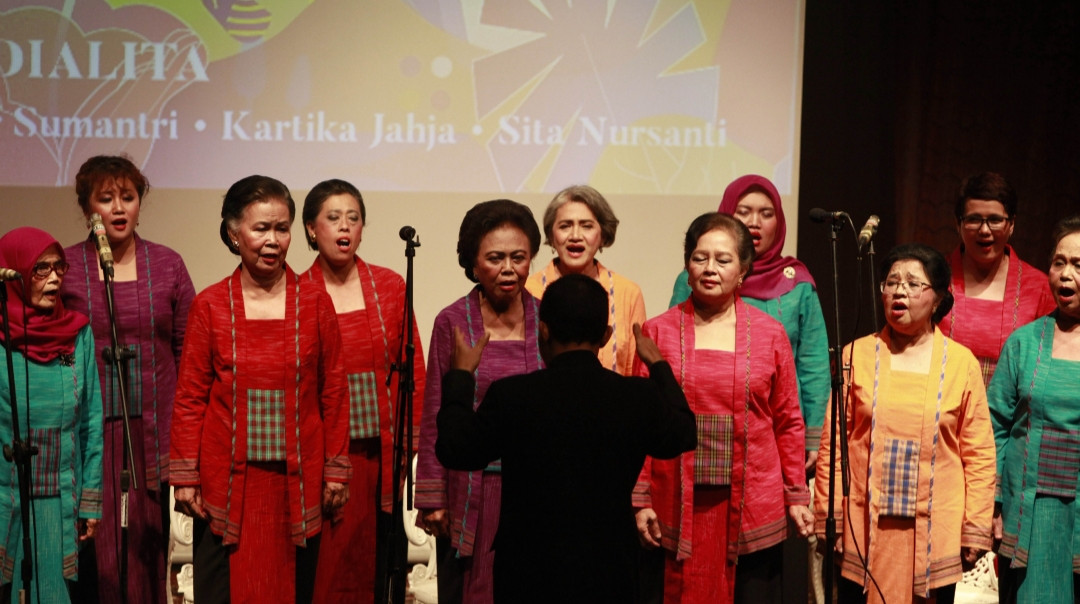Popular Reads
Top Results
Can't find what you're looking for?
View all search resultsPopular Reads
Top Results
Can't find what you're looking for?
View all search resultsDialita choir's new album celebrates hope
The all-female choir, Dialita, has released their second album, Salam Harapan (Greetings of Hope), with a jubilant concert.
Change text size
Gift Premium Articles
to Anyone
Dialita choir celebrates joy with their second album, Salam Harapan (Greetings of Hope).
The acronym Dialita, which stands for "di atas lima puluh tahun" and refers to women over 50, has become synonymous with joy in the face of adversity.
Several members of the choir of above-50 women were relatives of political prisoners who were incarcerated during the 1965-1966 purge of communists and suspected communists in the country; two of its members were political prisoners.
Since 2000, the Dialita women have been collecting the lyrics written by female political prisoners of that turbulent era, such as Zubaidah Nungtjik or choir member Utati, on their ordeal at facilities like the Plantungan women's camp in Central Java. Their grave reality eventually became memories; these memories have now been set to music.
Following the 2016 release of their inaugural album Dunia Milik Kita (The World Is Ours) with the help of mostly Yogyakartan musicians like Frau or Sisir Tanah, the choir has now released Salam Harapan that features the lyrics of female political prisoners.
This time, Bonita and her husband Petrus “Adoy” Briyanto Adi, musicians from the Bonita & the Hus Band, were on board as producers, along with musicians such as Kartika Jahja, Siti Nursanti, Junior Soemantri and Endah Widiastuti.
And so a tragedy was what introduced people to Dialita, but it is this irresistible jubilee that they’ll be remembered for.
At the concert celebrating the release of Salam Harapan, held Thursday evening at the Goethe-Institut Jakarta, the mood was exuberant throughout. It was also fitting that Rumah Bonita — Bonita and Adoy’s record label — was behind the occasion, as it had also organized the tour that played in the personal homes of volunteers.
Uchikowati of the Dialita choir delivered an opening speech during which she invited Eko Agus Purnomo to the stage, introducing him as a taxi driver and one of the first few people “who knew what Dialita was [about] from the beginning”.
That beginning was years ago, when Dialita was to perform at the Kedai Tjikini cafe, but couldn’t find anyone to play the music. Eko, their driver at the time, happened to be a former bass player, so they asked him if he could play the guitar to accompany them. As it turned out, the cafe didn't have a guitar, only a piano.
Eko didn't flinch, and so he played the piano. “I was really surprised because he told us, ‘You were all great’,” recalled Uchikowati.
After they finished the show, the choir readied an ensemble to accompany them – mostly the same ensemble that performed with Dialita at a December 2017 concert at the Graha Bakti Budaya cultural center.
Each song at that concert commenced with the retelling of the story behind it. For example, birthdays were still celebrated in prison, but the usual birthday song didn’t feel right. So Zubaidah wrote “Tetap Senyum Menjelang Fajar” (Still Smiling as Dawn Comes), which is the opening track of Salam Harapan,. Sita, with her high, clear voice, sang it at the concert to the accompaniment of rousing, folk-style music (strings, guitars, bass, drums).
A tragic romance is told in “Mawar Merah” (Red Rose), a jazz tune with Adoy's lyrical arrangement that was sung by Junior. The songs traverse a variety of musical styles: “Ibu” (Mother), sung by Endah, is a lovely, slow-burning paean to mothers who were separated from their daughters, while “Aku Percaya” (I Believe) is sung by the entire choir and presents the women's vocal range and solid harmony.
In the evening, Uchikowati announced there are still over 30 lyrics that have not been recorded. Rest assured, the joy continues on. (ste)











